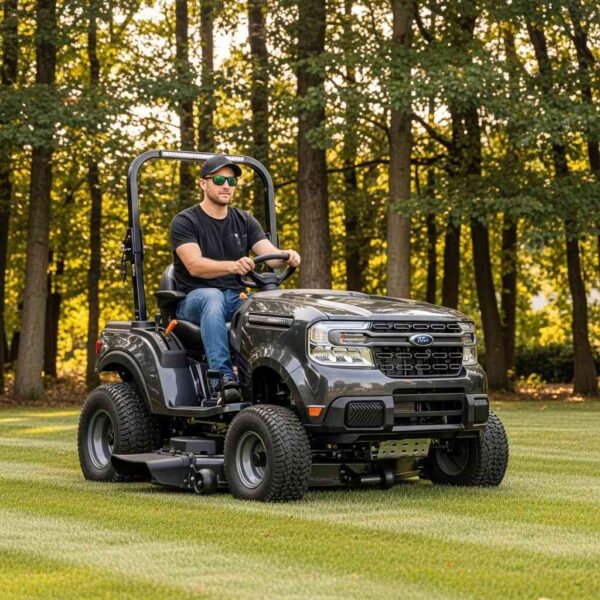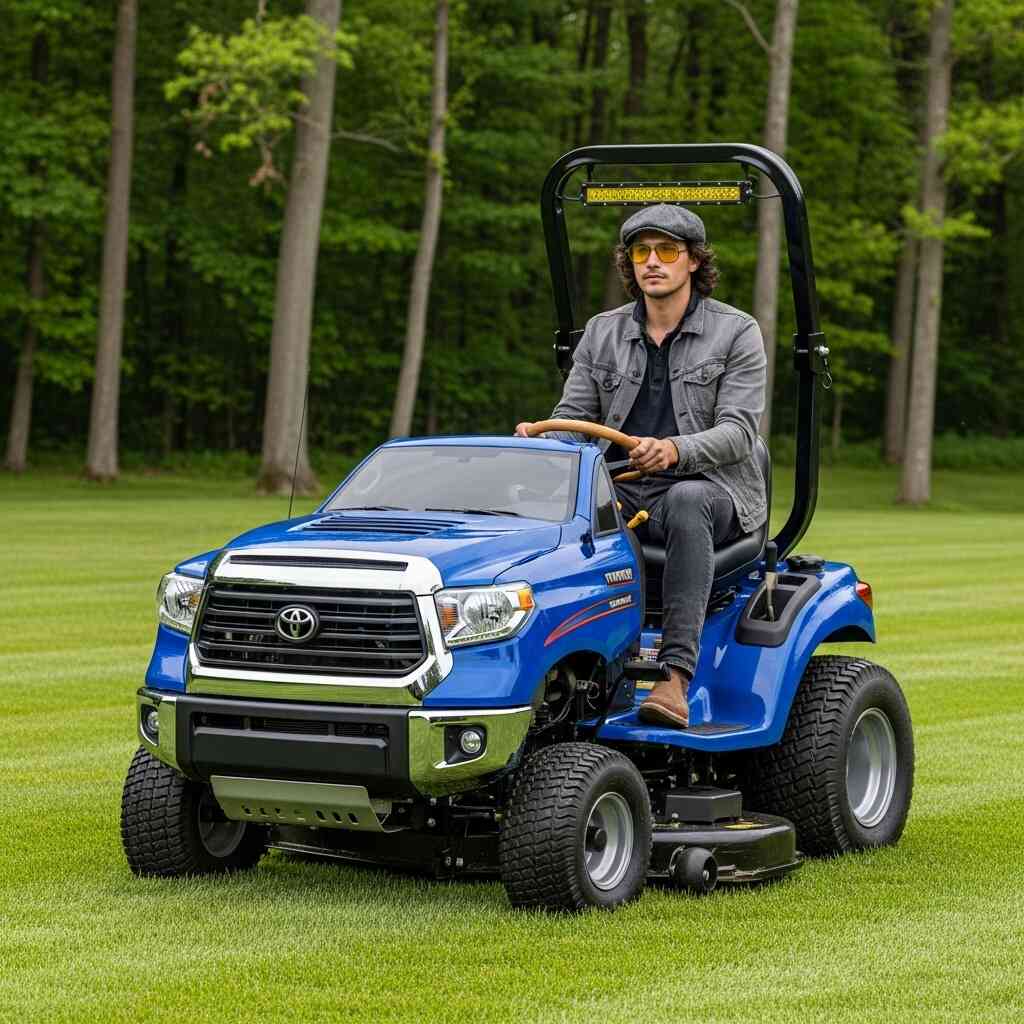In the ever-evolving landscape of lawn care and outdoor maintenance, innovation often comes from necessity. Among the more unconventional tools that have found their place in modern landscaping is the pickup truck lawn mower—a unique fusion of utility vehicle and mowing equipment. While traditionally associated with straightforward grass-cutting tasks, these powerful machines offer far more potential than many realize.
Pickup truck lawn mowers are not just about efficiency; they’re about versatility. Mounted or towed behind a pickup truck, these mowers combine the rugged mobility of a four-wheel drive vehicle with the precision of professional-grade cutting systems. What makes them particularly intriguing is how adaptable they can be beyond their primary function. Whether you’re managing large tracts of land, maintaining public spaces, or simply looking for a smarter way to handle your yard work, pickup truck lawn mowers open up a world of creative possibilities.
This article explores the diverse and imaginative applications of pickup truck lawn mowers. From transforming landscapes into works of art to repurposing the setup for winter maintenance, we’ll delve into how these machines can be leveraged in ways that go well beyond the traditional mowing season. We’ll also examine how they serve as platforms for multi-seasonal use, community projects, and even small-scale farming—proving that with a bit of ingenuity, these tools can become indispensable assets in both personal and professional settings.
By understanding the full scope of what pickup truck lawn mowers can do, users can maximize their investment, reduce labor time, and unlock new avenues for creativity and productivity in outdoor management. Let’s explore how this hybrid tool is redefining the boundaries of lawn care.
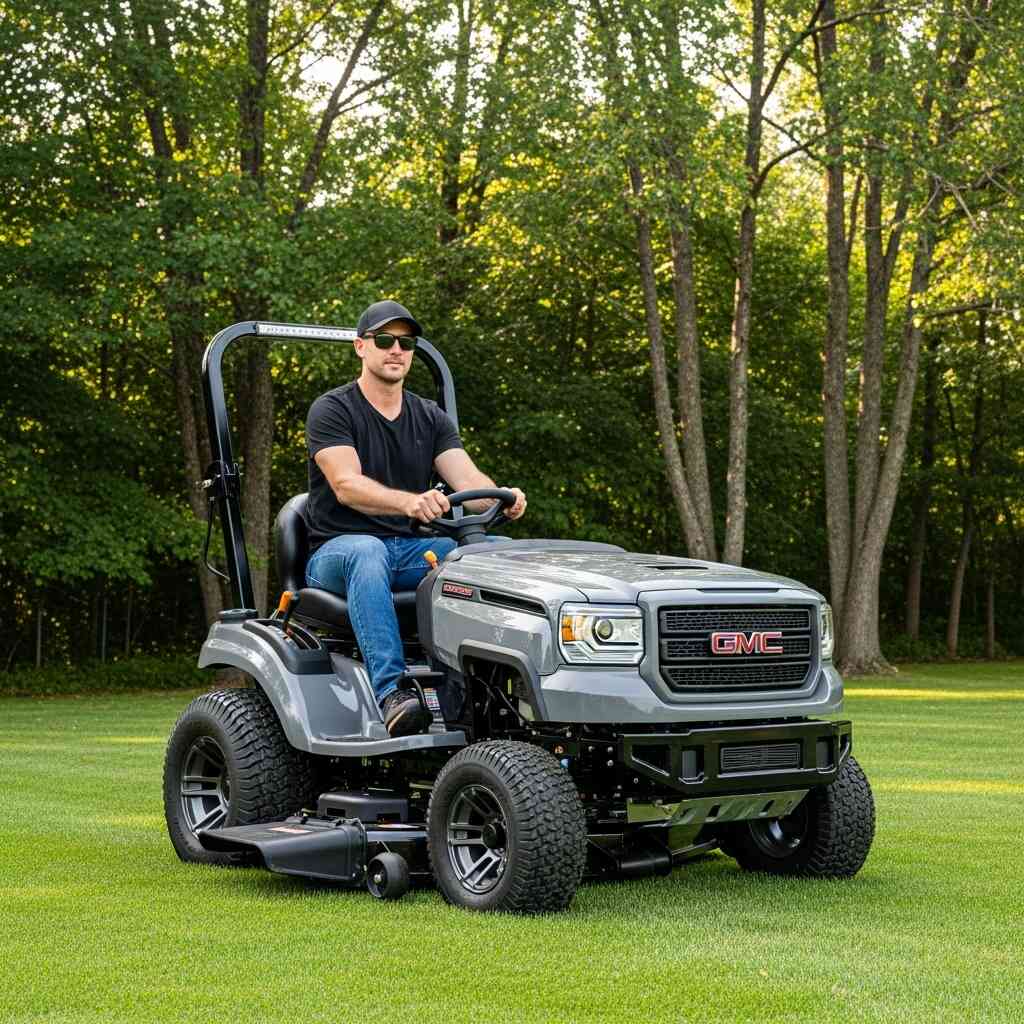
Contents
Beyond Basic Mowing: The Evolution of Pickup Truck Lawn Mowers
At first glance, a pickup truck lawn mower might seem like an oversized solution to a simple problem—cutting grass. However, its design inherently allows for greater flexibility compared to standard riding mowers or push models. These mowers typically attach to the rear of a pickup truck using a hitch system, allowing the vehicle itself to power the movement while the mower handles the cutting. This configuration offers several advantages, including increased ground clearance, better maneuverability over rough terrain, and the ability to carry additional tools or materials during operation.
Historically, such setups were popular among farmers and ranchers who needed to maintain vast areas of land without investing in multiple pieces of equipment. Over time, the technology improved, and manufacturers began producing specialized attachments designed specifically for integration with trucks. Today’s models come equipped with features such as adjustable cutting heights, mulching capabilities, and even GPS-guided systems for precision mowing.
But the real evolution lies not just in the engineering but in the mindset shift around their usage. No longer are these mowers seen solely as tools for trimming lawns—they are now viewed as mobile bases for a wide array of outdoor tasks. Their adaptability stems from the fact that they already integrate with a vehicle that’s built for hauling, towing, and navigating difficult terrain. As a result, owners have begun experimenting with modifications and alternative uses that extend far beyond mowing.
One of the most significant shifts in perception has been the move toward customization. Users have started retrofitting their mowers with accessories like sprayers, seed spreaders, and even snowplows. This modular approach allows one machine to serve multiple purposes throughout the year, reducing the need for seasonal replacements and increasing overall utility.
Moreover, the rise of DIY culture and online communities has further fueled interest in innovative uses for pickup truck lawn mowers. Enthusiasts share tips, tricks, and custom builds across forums and social media platforms, inspiring others to think creatively about how they can make the most of their equipment.
The key takeaway here is that pickup truck lawn mowers are no longer confined to their original purpose. With a little imagination and some mechanical know-how, they can be transformed into versatile tools capable of handling a wide range of outdoor challenges. In the following sections, we’ll explore some of the most creative and practical applications of these machines, demonstrating how they can be used to enhance productivity, reduce effort, and even contribute to artistic expression in landscaping.
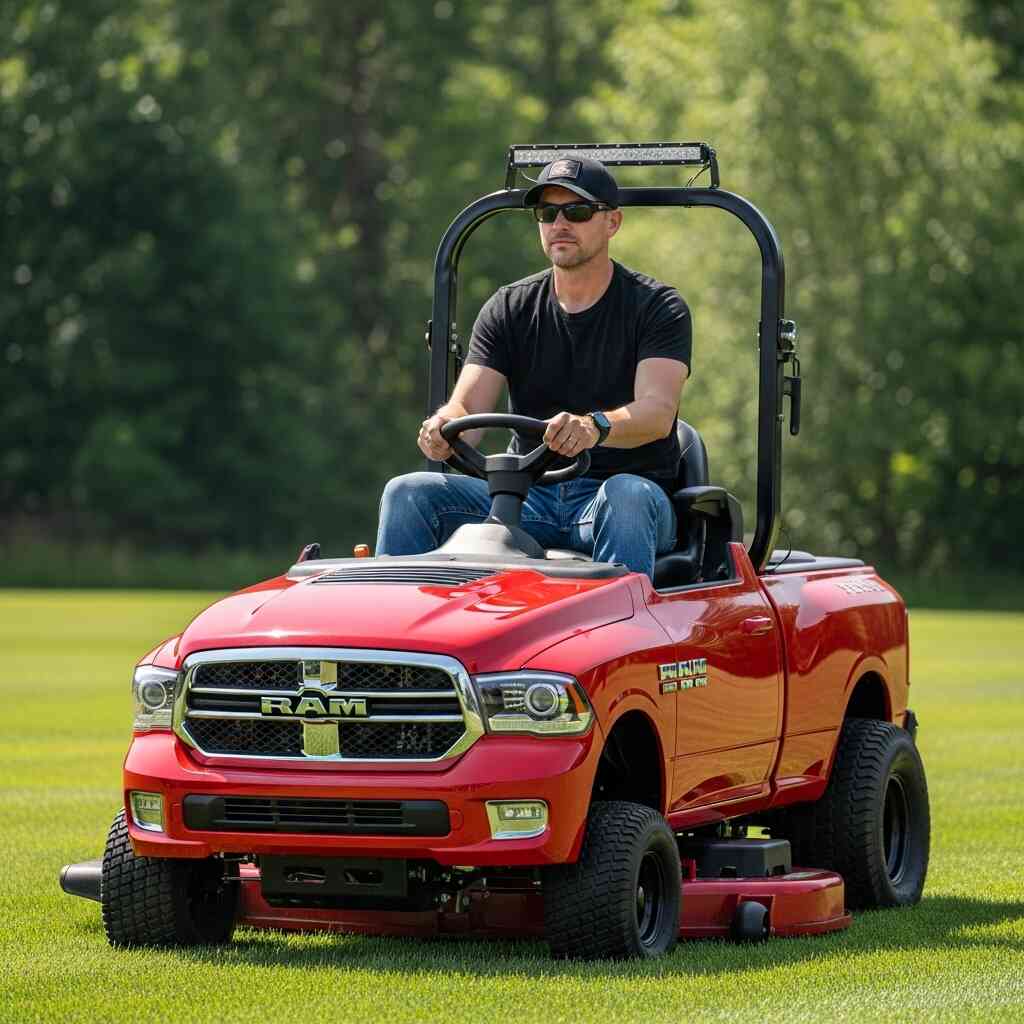
Creative Application 1: Artistic Landscaping and Pattern Creation
One of the most visually striking uses of pickup truck lawn mowers is in the realm of artistic landscaping. Traditionally, creating intricate patterns on lawns required specialized striping kits or roller attachments on smaller mowers. However, with the scale and power of a pickup truck-mounted system, it becomes possible to execute larger, more complex designs that would be impractical with conventional methods.
The process begins by adjusting the mower deck height and direction to manipulate how the grass blades bend and reflect light. By varying the angle and pressure applied during each pass, operators can create contrasting bands of light and dark green—an effect commonly seen on sports fields and meticulously groomed golf courses. What sets pickup truck lawn mowers apart is their ability to cover large surfaces quickly while maintaining consistent patterns, making them ideal for parks, estates, or commercial properties where visual appeal is paramount.
Beyond basic striping, more advanced techniques involve mowing in geometric shapes, curves, and even lettering. Some users have taken this concept further by incorporating temporary stencils or barriers to guide the mower along specific paths. For example, a park manager could use a pickup truck lawn mower to carve out holiday-themed designs—like hearts in February, clover shapes in March, or stars and stripes in July—transforming a flat expanse of grass into a dynamic canvas.
Additionally, some landscapers have combined pickup truck mowers with GPS mapping software to plan and execute highly detailed layouts. By inputting digital blueprints into a guidance system, the operator can follow precise routes that ensure symmetry and proportionality across the entire area. This level of control allows for the creation of logos, mascots, or other branded imagery directly into the turf, which can be especially effective for businesses or event venues looking to add a unique touch to their grounds.
It’s worth noting that achieving high-quality patterns requires careful planning and attention to detail. Factors such as grass type, growth rate, and weather conditions all play a role in how well the patterns hold up over time. Nevertheless, when done correctly, the results can be stunning—turning ordinary lawn maintenance into an opportunity for creative expression.
Perhaps most importantly, this application highlights the evolving relationship between technology and aesthetics in landscaping. Pickup truck lawn mowers, once purely functional tools, are now being embraced as instruments of design. Whether used for seasonal displays, corporate branding, or personal satisfaction, they enable users to turn large-scale mowing into an art form.
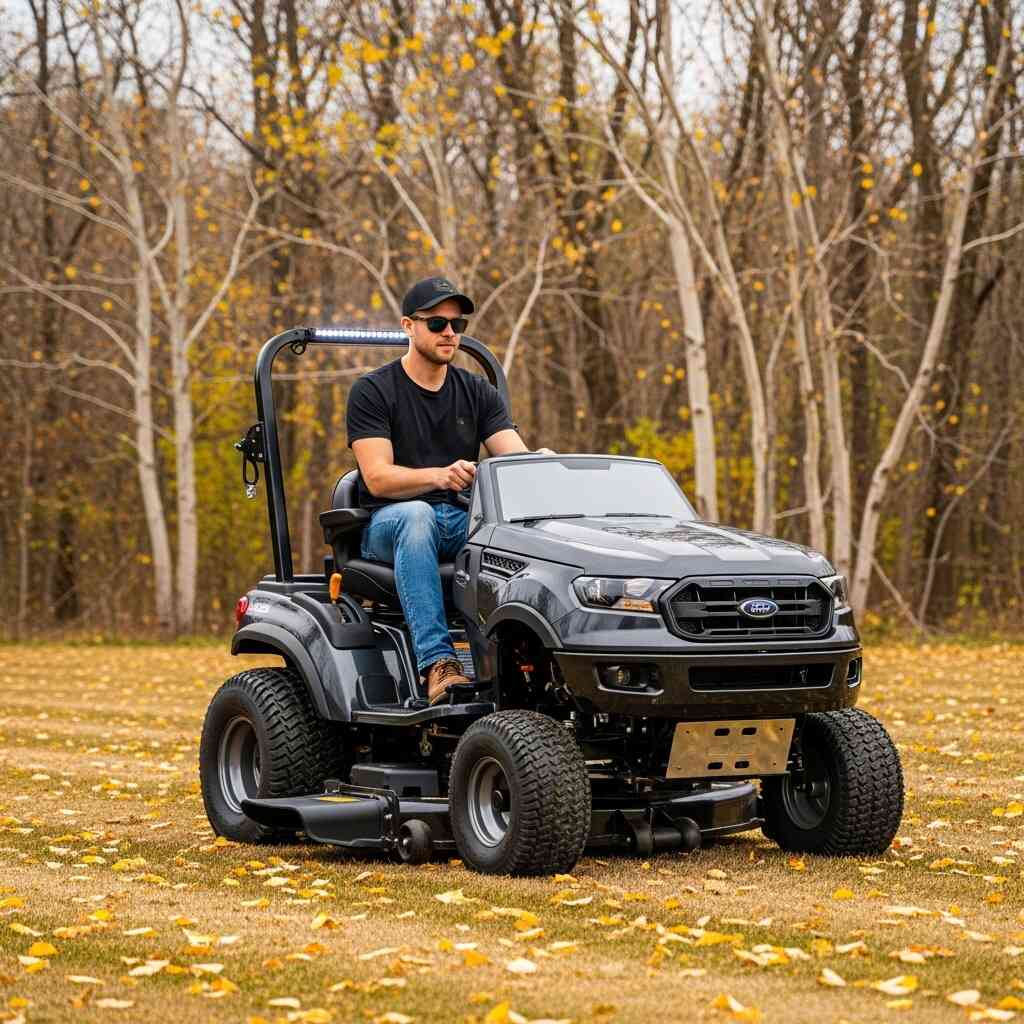
Creative Application 2: Multi-Seasonal Use and Winter Adaptations
While pickup truck lawn mowers are primarily associated with warm-weather maintenance, their modular nature lends itself well to seasonal adaptations. One of the most practical and inventive uses involves converting the mower setup for winter tasks, particularly snow removal. Given that pickup trucks are already common vehicles for plowing snow, integrating a snowplow attachment onto a mower frame—or repurposing the mounting hardware—can create a dual-purpose system that remains useful year-round.
To achieve this, many users remove the mower deck during colder months and replace it with a snowplow blade or a front-mounted pusher. Some have even developed custom brackets that allow for quick switching between mowing and plowing configurations. This adaptability ensures that the same truck can be used for both cutting grass in the summer and clearing driveways, parking lots, or pathways in the winter—without requiring separate vehicles or extensive storage space.
Beyond snowplowing, there are other winter-specific applications that take advantage of the truck’s mobility and strength. For instance, some property owners install sand or salt spreaders behind the truck to aid in de-icing roads and walkways. These can be mounted in place of the mower or attached alongside it, depending on the available space and desired functionality. Similarly, chain harrows or drag mats can be pulled behind the truck to break up icy patches or smooth gravel surfaces after a thaw.
Another innovative adaptation involves using the truck’s hydraulic system to power auxiliary tools. Many modern pickup truck lawn mowers come equipped with PTO (power take-off) systems or hydraulic pumps that can be redirected to operate different attachments. This means that instead of letting the equipment sit idle during winter, owners can continue utilizing the same mechanical infrastructure for a variety of cold-weather tasks.
Furthermore, the off-road capability of pickup trucks makes them ideal for navigating snowy or muddy terrain where traditional plows might struggle. This is especially beneficial for rural properties, farms, or recreational areas where paved roads may be limited, and access to heavy-duty snow removal services is minimal.
By embracing these seasonal transformations, pickup truck lawn mowers prove their value extends far beyond the growing season. They become essential components of a comprehensive outdoor maintenance strategy—one that adapts to the changing needs of the environment and the user alike.
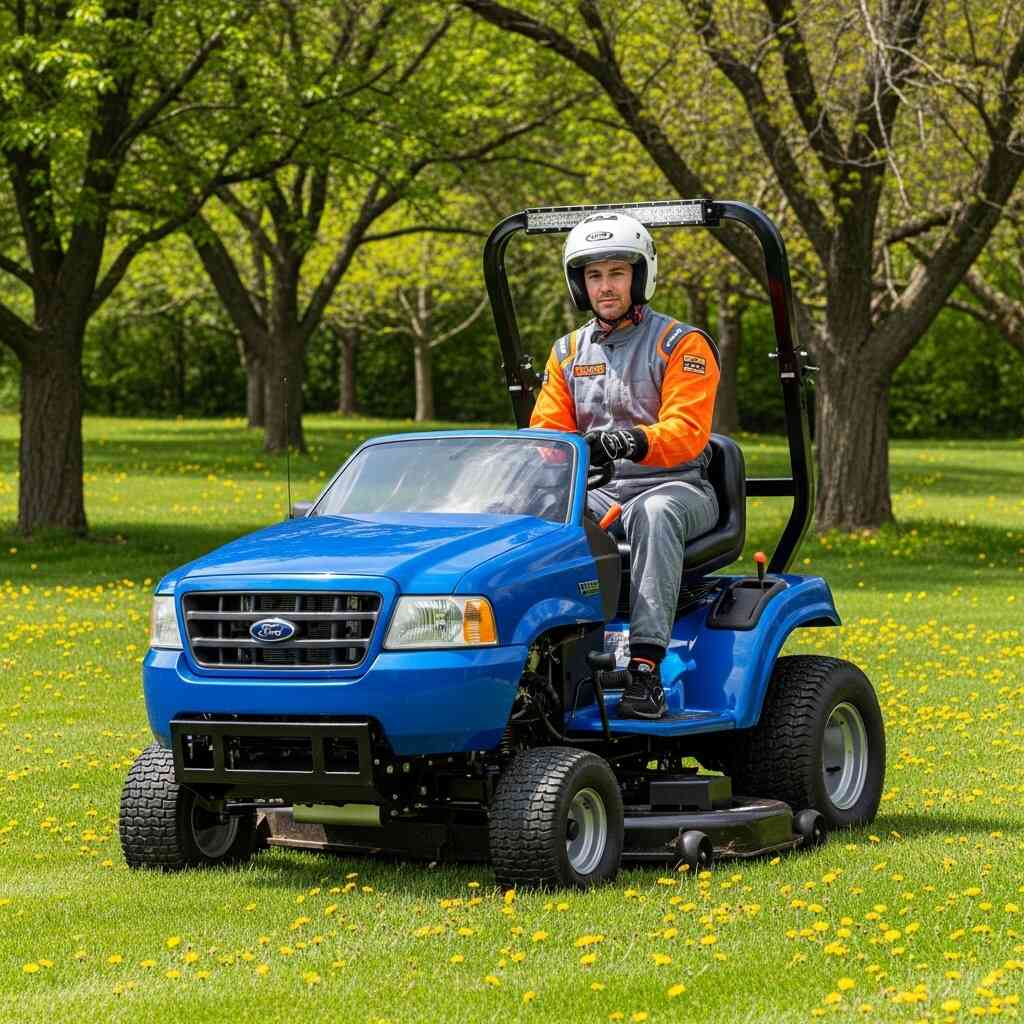
Creative Application 3: Community Projects and Public Space Maintenance
The utility of pickup truck lawn mowers isn’t limited to individual property owners or private enterprises. In fact, one of their most impactful applications lies in supporting community-driven initiatives and maintaining shared public spaces. Municipalities, neighborhood associations, and volunteer groups have increasingly turned to these versatile machines to manage parks, trails, school grounds, and other communal areas efficiently and cost-effectively.
One of the primary advantages of using pickup truck lawn mowers in public space maintenance is their ability to cover large areas quickly. Unlike smaller mowers that require frequent refueling or battery changes, these systems can operate continuously for extended periods, making them ideal for managing expansive landscapes. This efficiency is particularly valuable in urban and suburban settings where public parks and recreation areas demand regular upkeep to remain accessible and aesthetically pleasing.
Additionally, the mobility of pickup trucks allows for easy access to remote or uneven terrain within parks and natural reserves. Trails lined with tall grass, unused fields, and embankments near waterways can all benefit from targeted mowing without requiring expensive or cumbersome machinery. This kind of maintenance helps prevent overgrowth, reduces fire hazards, and improves visibility for pedestrians and cyclists.
Community gardening projects have also found creative uses for pickup truck lawn mowers. In urban agriculture initiatives, volunteers often use modified versions of these mowers to clear overgrown plots before planting seasons begin. Some have even adapted the mowers to include seed spreaders or compost applicators, enabling simultaneous preparation and fertilization of soil—an invaluable asset for large-scale community gardens.
Schools and youth organizations have similarly benefited from the accessibility of pickup truck lawn mowers. Educational institutions with athletic fields or outdoor learning spaces often rely on these machines to keep playing areas safe and usable. Moreover, some programs incorporate the use of these mowers into vocational training, teaching students mechanical skills, teamwork, and environmental stewardship through hands-on participation in landscape maintenance.
Public events and festivals also utilize pickup truck lawn mowers to prepare large outdoor venues. Whether it’s flattening tall grass for concert grounds, clearing camping sites at music festivals, or maintaining festival parking lots, these machines provide a reliable solution for last-minute preparations. Their ability to navigate tight spaces and perform under pressure makes them ideal for time-sensitive event logistics.
Perhaps most significantly, the use of pickup truck lawn mowers in community projects fosters a sense of collective responsibility and civic engagement. When residents participate in maintaining shared spaces, it strengthens neighborhood bonds and encourages sustainable practices. Local governments and nonprofits have recognized this potential and have begun organizing volunteer-led mowing days, where participants rotate responsibilities and learn proper techniques for efficient, eco-friendly maintenance.
By leveraging the capabilities of pickup truck lawn mowers for community-based efforts, municipalities and grassroots organizations can improve public environments while engaging citizens in meaningful, hands-on contributions. This collaborative approach not only enhances the physical appearance of shared spaces but also promotes environmental awareness and long-term sustainability.
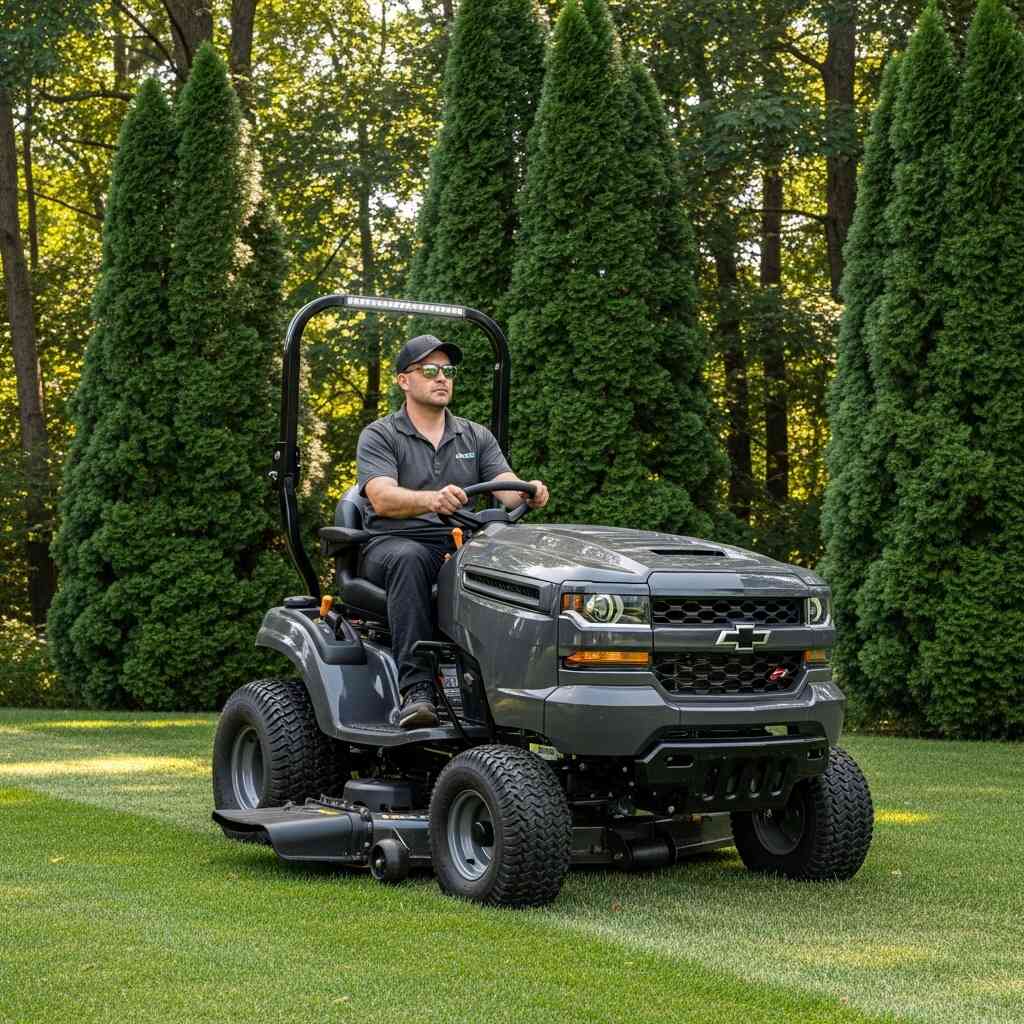
Creative Application 4: Supporting Small-Scale Farming and Agriculture
Beyond landscaping and public maintenance, pickup truck lawn mowers have found a surprising yet practical niche in small-scale farming and agricultural operations. Farmers, homesteaders, and permaculture enthusiasts have discovered that these machines can be repurposed to support various aspects of crop management, pasture maintenance, and land preparation—all without requiring costly or specialized farm equipment.
One of the most common applications is the use of pickup truck lawn mowers for managing hayfields and grazing pastures. Traditional mowers designed for large-scale farming can be prohibitively expensive for small landowners, but a pickup truck-mounted system provides an affordable alternative. By adjusting the cutting height and width, operators can effectively trim grasses and legumes to encourage regrowth while maintaining optimal conditions for livestock grazing. Some have even integrated conditioning rollers behind the mower to help dry cut hay more quickly, improving forage quality.
For those practicing rotational grazing or managing mixed-use land, pickup truck lawn mowers offer the flexibility to selectively mow certain areas without disturbing adjacent crops or structures. This selective mowing helps control weed growth, prevents invasive species from overtaking desirable plants, and maintains a tidy appearance around barns, fencing, and irrigation systems.
Another innovative use involves modifying the mower setup to function as a brush cutter or flail mower. By replacing the standard blades with heavy-duty cutting heads, farmers can tackle overgrown brush, thorny weeds, and woody vegetation that would otherwise require manual clearing or chemical treatments. This method is particularly useful for reclaiming neglected land or maintaining fence lines and firebreaks around agricultural properties.
In addition to vegetation management, some users have adapted pickup truck lawn mowers for seeding and top-dressing applications. By attaching seed spreaders or compost applicators to the back of the truck, operators can simultaneously mow and replenish nutrients in the soil—streamlining the process of preparing fields for planting. This dual-action approach is especially beneficial for organic farms or regenerative agriculture projects that prioritize soil health and biodiversity.
Moreover, the mobility of pickup trucks enables farmers to reach remote corners of their property that might be inaccessible to larger tractors. Whether managing orchards, vineyards, or backyard chicken coops, these mowers provide a nimble yet powerful solution for keeping the surrounding landscape well-maintained.
Perhaps most importantly, the integration of pickup truck lawn mowers into small-scale farming operations exemplifies the broader trend of resourcefulness in sustainable agriculture. By adapting existing tools rather than purchasing new equipment, farmers can reduce costs, minimize environmental impact, and maximize the utility of their vehicles. This approach aligns with the principles of permaculture and agroecology, where efficiency and multifunctionality are key.
As awareness of these benefits grows, more agriculturalists are exploring ways to customize their setups for specific farming needs. Whether through DIY modifications or collaboration with local mechanics, the potential for pickup truck lawn mowers in the agricultural sector continues to expand—offering a scalable, adaptable solution for landowners committed to responsible land stewardship.
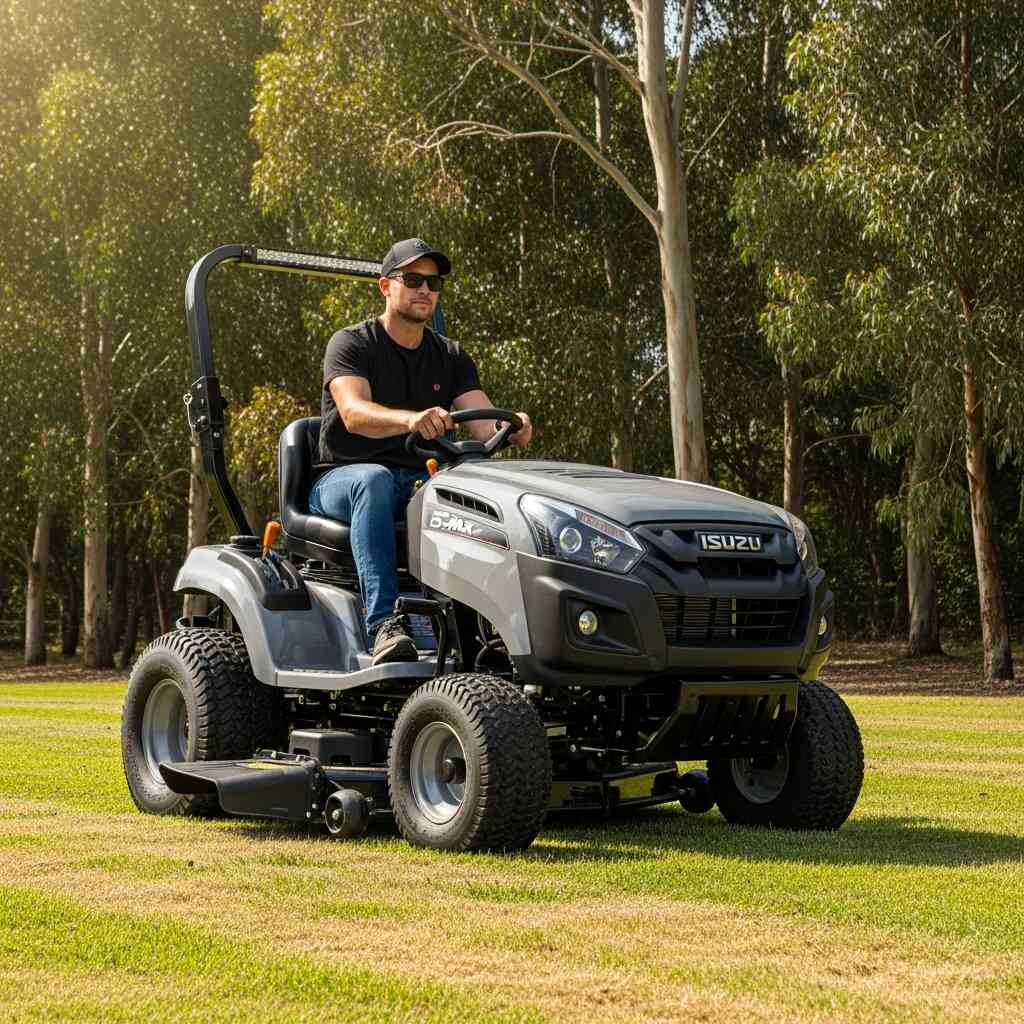
Creative Application 5: Enhancing Outdoor Events and Recreational Areas
Outdoor events—from music festivals and sporting competitions to county fairs and farmer’s markets—require meticulous preparation to ensure safety, accessibility, and aesthetics. Pickup truck lawn mowers have emerged as essential tools in this context, offering a powerful and flexible solution for maintaining event grounds, sports fields, and recreational spaces.
One of the most critical functions of pickup truck lawn mowers in event preparation is field grooming. Whether it’s a soccer pitch, baseball diamond, or football field, maintaining a clean, evenly cut surface is vital for player performance and injury prevention. These mowers allow groundskeepers to quickly and efficiently trim large expanses of grass, ensuring uniformity and consistency across the playing area. Additionally, the ability to adjust cutting heights enables fine-tuning based on sport-specific requirements—for example, shorter grass for soccer and slightly taller grass for rugby.
Beyond formal sports fields, pickup truck lawn mowers are instrumental in preparing general event spaces. Large festivals or concerts often take place on open fields or meadows that require extensive mowing prior to setup. Clearing tall grass not only improves the visual appeal but also enhances safety by reducing tripping hazards and minimizing insect presence. Some event organizers have even used patterned mowing techniques to create welcoming entryways, directional pathways, or stage backdrops—adding a layer of professionalism and aesthetic appeal to the venue.
Recreational parks and campgrounds also benefit from the efficiency of pickup truck lawn mowers. Maintaining trails, picnic areas, and RV hookups requires consistent upkeep, especially in regions with rapid grass growth. The mobility of a pickup truck allows operators to reach remote corners of a park without the need for multiple machines, streamlining maintenance efforts and reducing labor demands.
Another innovative use involves preparing campsite layouts. Some campground managers have employed pickup truck lawn mowers to delineate tent spaces, flatten uneven ground, and maintain perimeter edges around cabins or recreational facilities. This level of organization contributes to a more pleasant visitor experience and helps preserve the natural environment by discouraging foot traffic from straying into sensitive areas.
Moreover, the adaptability of these mowers allows for additional functionalities during event logistics. Some organizers have installed temporary lighting rigs, signage holders, or sound equipment mounts onto the mower frame, turning the unit into a multipurpose platform. Others have added misting systems or dust suppressors to improve comfort levels during hot summer events.
By integrating pickup truck lawn mowers into event planning and execution, organizers can ensure that outdoor venues are both functional and visually appealing. These machines provide the necessary groundwork for successful gatherings, demonstrating their value extends far beyond routine lawn maintenance.
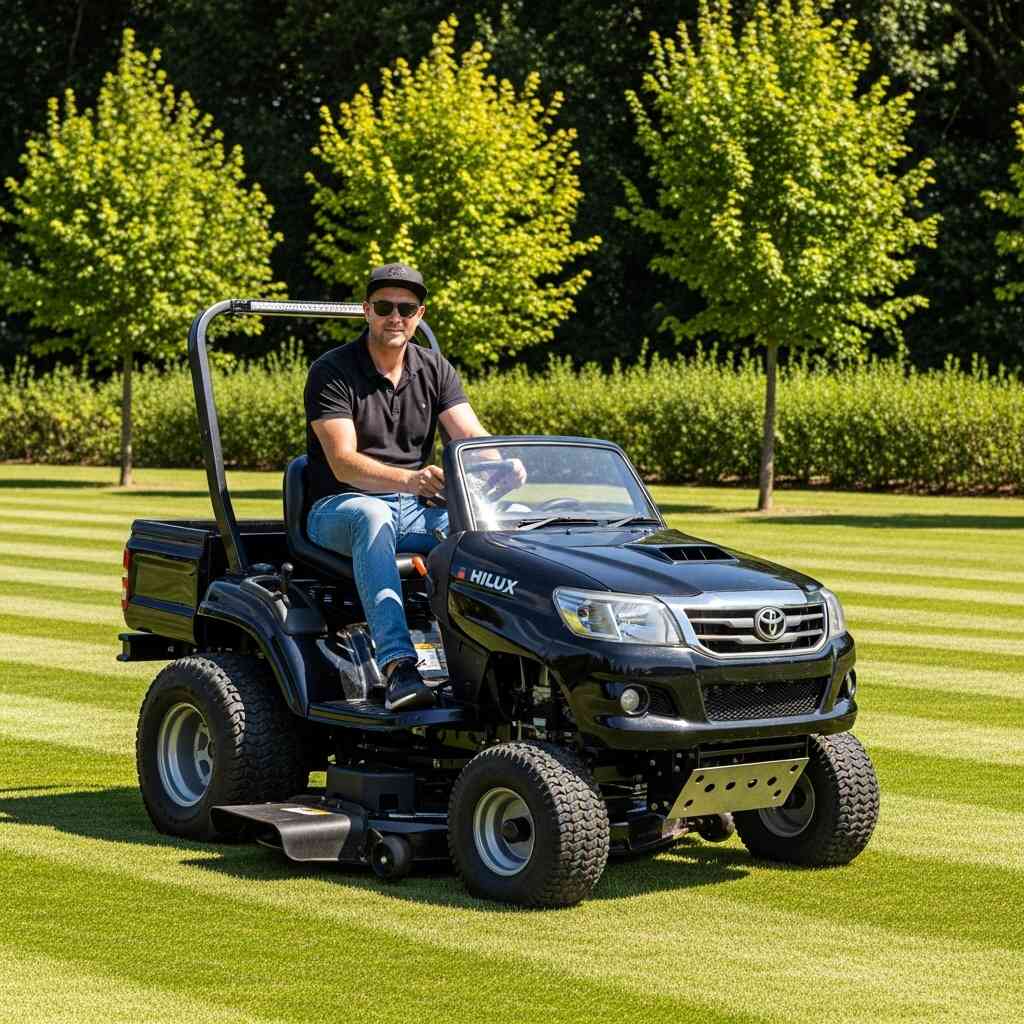
Conclusion
The creative uses for pickup truck lawn mowers illustrate a remarkable shift in how we approach outdoor maintenance and land management. Originally designed for efficiency in cutting large swaths of grass, these machines have evolved into versatile platforms capable of supporting a wide range of activities throughout the year. From artistic landscaping and winter adaptations to community projects, small-scale farming, and event preparation, pickup truck lawn mowers offer solutions that blend functionality with innovation.
Their ability to transform ordinary mowing tasks into opportunities for design, sustainability, and collaboration speaks to the broader trend of maximizing utility in modern outdoor equipment. Whether used to create intricate patterns on lawns, clear snow-covered driveways, assist in municipal maintenance, or support agricultural endeavors, these mowers exemplify the power of adaptability.
What makes pickup truck lawn mowers truly unique is their capacity to grow with the needs of their users. Through customization, seasonal modifications, and creative problem-solving, individuals and organizations alike have found ways to extract maximum value from a single piece of equipment. This not only reduces the burden of owning multiple machines but also encourages a more thoughtful and resource-conscious approach to land care.
As technology continues to advance and user communities continue to share ideas, the potential for pickup truck lawn mowers will only expand. Whether you’re a homeowner looking to elevate your curb appeal, a community organizer aiming to beautify public spaces, or a farmer seeking efficient land management tools, there’s no doubt that these mowers can play a central role in your outdoor strategy.
Ultimately, pickup truck lawn mowers remind us that sometimes the most effective solutions come from thinking outside the box—and in this case, quite literally driving beyond the traditional boundaries of lawn care.

